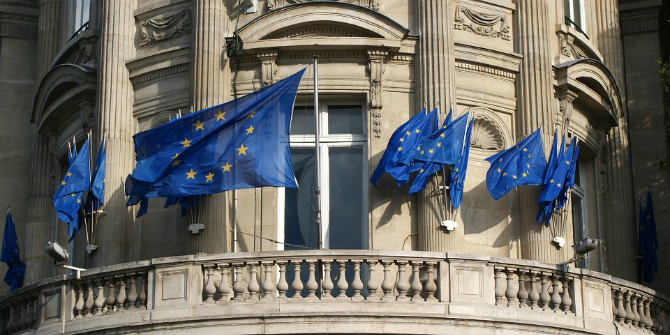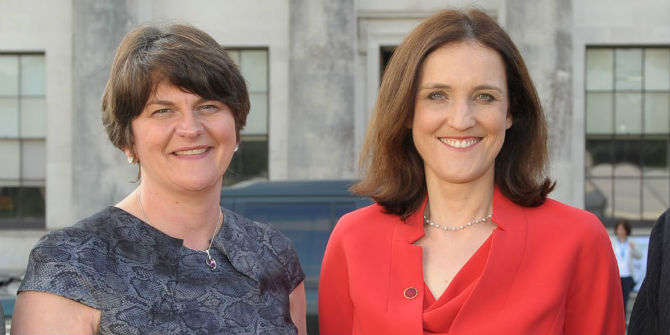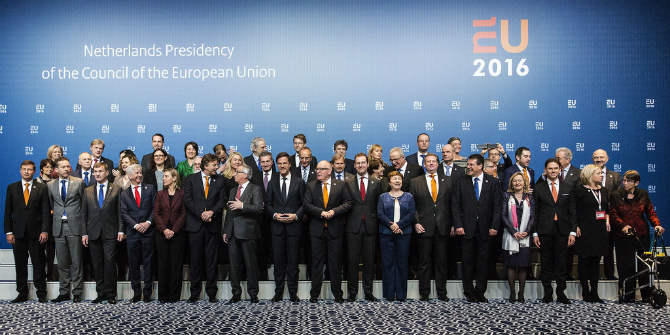 Britain and the EU need each other, but Britain needs the EU more than vice versa, argues Holger Schmieding, writing in response to the session of the LSE Commission of the Future of Britain in Europe chaired by Kevin Featherstone. He claims that after a Brexit there’s a risk that more countries may consider leaving the EU. In order to prevent such ripple effect, the core countries of the European Union, which remains the best compromise machine on earth, would push for reforms and closer integration.
Britain and the EU need each other, but Britain needs the EU more than vice versa, argues Holger Schmieding, writing in response to the session of the LSE Commission of the Future of Britain in Europe chaired by Kevin Featherstone. He claims that after a Brexit there’s a risk that more countries may consider leaving the EU. In order to prevent such ripple effect, the core countries of the European Union, which remains the best compromise machine on earth, would push for reforms and closer integration.
Britain earns 13% of its GDP by exporting goods and services to the other EU members. In turn, these other EU members earn less than 4% of their GDP by sending goods and services across the Channel. Britain accounts for a mere 17% of the joint GDP of the EU. As a result of this asymmetry, the other EU members could set most of the terms in the ‘divorce negotiations’ after a Brexit. They could see to it that Britain could only maintain access to the common market for goods and services only on terms set by the EU. For every restriction that Britain would place on the free movement of labour, the other EU countries could impose more serious restrictions on Britain’s ability to sell financial and other services to the European continent.
Although Britain would lose much more than the rest of the European Union, the economic impact could be serious on the continent as well. The very uncertainty about the outcome of divorce negotiations with the second biggest trading partner for the Eurozone (after the US) would hurt business confidence and investment for a while.
Losing Britain would be a blow to the international reputation of the EU and to its clout. More importantly, it would raise questions about the future cohesion of the EU and the Eurozone, mirroring the uncertainty within Britain as to the potential independence of Scotland. The ultra-right and ultra-left in France, Italy and a few other countries have occasionally demanded to hold national referenda on leaving the EU or the euro. After the precedent of a Brexit, financial markets would pay much more attention to such demands. The result could be a rise in risk premia and a spreading of financial turbulence from Britain to the Continent. Unlike the euro crisis of 2011-2012, which the European Central Bank could, and finally did, end by showing its hand as lender of last resort, such potential financial upheaval could not be brought under control by any central bank. Concerns about the political cohesion of the region would require a political response.

As Kevin Featherstone argues, a Brexit would be a lose-lose situation for both Britain and the remainder of the EU. After a Brexit, the top priority for most mainstream politicians on the continent would be to prevent other countries from breaking away. Facing such concerns, France and Germany would probably get together fast to strengthen the core of the EU and the Eurozone through further integration in some key areas such as fiscal policy and a joint deposit insurance. The “Five Presidents Report” on the steps needed to bolster the Eurozone could serve as a blueprint for such discussions. After some noise, the key political result of a Brexit on the Continent could be that Germany and France move closer together, inviting all other EU members to be part of such a reinforced core. Many of them would probably accept that invitation, some others countries would probably choose to opt out from such further integration. That would add a further element of variable geometry to the EU.
The risk that populists in some EU countries will campaign in favour of leaving the EU after a Brexit is serious. A Brexit would be a major challenge for the EU as a whole, possibly the toughest test since De Gaulle’s “empty chair” policy in 1965. But chances are that the EU would, in the end, come to grips with that challenge. Warts and all, the European Union is the best compromise machine on earth. The EU regularly brings 28 heads of state and government together to slug out their serious differences in long-night sessions in Brussels, only to agree on some compromises in the wee hours of the next morning. Arguably, the absence of Britain would not make it more difficult to find such compromises. So far, the EU has emerged from each crisis with stronger rather than weaker mechanisms for internal cooperation.
This post represents the views of the author and not those of the BrexitVote blog, nor the LSE. Free image from Pixabay.
Dr Holger Schmieding is Chief Economist at Berenberg in London. Before joining Germany’s oldest private bank in October 2010, he worked as chief Economist Europe at Merrill Lynch, Bank of America and at Bank of America-Merrill Lynch in London.







Some of these predictions are probably correct, however it is equally possible that the Euro project will fail regardless if Britain leaves or stays.
Our friends in the EU point out how brutally hard they are going to punish us if we dare to become independent.
Decent of them to let us know – don`t you think?
Threats are nothing new from Europe: they have done this for 2,000 years.
Look, if Turkey can happily live outside the EU but still export 42% if its total exports to the EU without standing by a fax machine, then the UK with 43% of its exports going to the EU [source the EIU] can certainly prosper & grow with World wide trade & do without a fax machine by its bedside.
Why do commentators always talk in percentages? Talk about it in Pound’s how many pounds of goods & services are exported to the EU rather than just through Rotterdam or Antwerp & how many Pound’s of goods are imported to the UK from the EU?
Now explain how will Ireland receive much of it’s imports if it couldn’t source from the UK? will Ireland suddenly stop watching SKY TV? will the Irish stop transiting through Heathrow? Will Europeans stop flying in planes that have wings & Engines? The major carriers use Rolls Royce engines that is their choice & not something the EU can inflict on them.
Who’s satellites monitor the worlds airlines? are EU airlines going to switch off their transponders? Who’s military is constantly being looked upon every time there is a mess occurring in the EU’s back yard or EU nations interests further afield come under distress?
Well Joe, the EU threats [& the EU are increasing their threats ] are somewhat outweighed by a hint that sauce for the goose is sauce for the gander [do you remember your grandmother saying that]?
The hint is that if the EU carries out the trade-war threats into reality the EU will see the UK loosen its commitment to NATO in Europe.
De Gaulle did not only have an “empty chair” at the European table but also at the NATO table.
If the crux of the argument is “after a Brexit there’s a risk that more countries may consider leaving the EU. In order to prevent such ripple effect, the core countries of the European Union, which remains the best compromise machine on earth, would push for reforms and closer integration”, surely then we should be reading an articled headed: the EU needs Britain much more than vice versa”.
Dr Schmieding is absolutely correct in his assessment, but it’s slightly depressing to see that the only people who have thus far responded in the comments section appear to possess the most cursory knowledge of international affairs, and economics. The myopia, ignorance and insularity of the Brexit camp would be amusing if the consequences of leaving the EU weren’t so grave.
If you genuinely want Britain to be sidelined from European affairs; have its influence and bargaining power on the international stage vastly reduced; see the country endure years of complex and costly wrangling as we attempt to extricate ourselves from existing treaties and renegotiate them from a far weaker bargaining position; to expedite Scotland’s departure from the United Kingdom; see the repeal of legislation governing – inter alia – working conditions and the environment; cause immeasurable damage to our relationship with America and the rest of the EU; engender even greater instability within Europe; diminish the likelihood of effective cooperation with other member states in areas such as internal and external security, and scientific collaboration; and relegate us to the status of a third-rate nation state, insular, isolated and irrelevant, drifting in obscurity on the western fringes of Europe then please, by all means vote to leave.
Let us not forget that it is all about politics not economics, may I suggest that one watches Peter Hitchen’s video :https://www.youtube.com/watch?v=CY_BgnZdwko